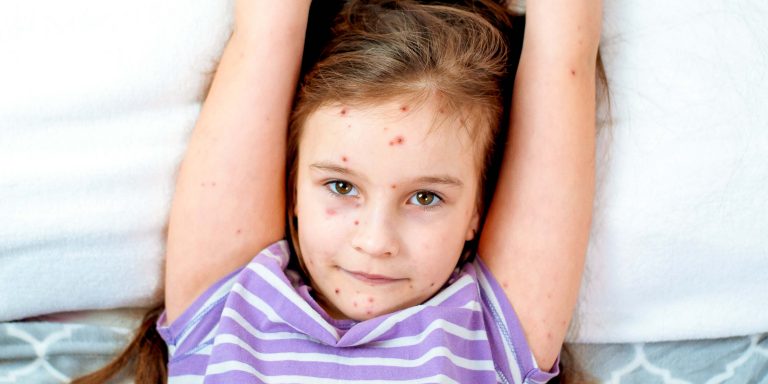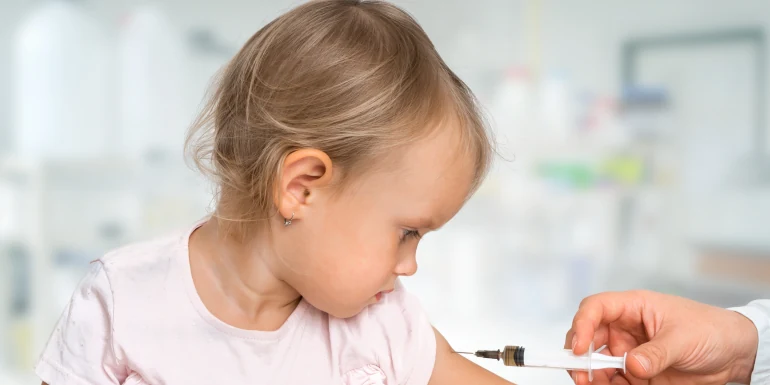
Chickenpox – what helps?
What helps with chickenpox, and how is it transmitted? How long do the symptoms last? Find out about the early and end stages of chickenpox, and about vaccination against the disease.
What is chickenpox?
Chickenpox, which is also known as varicella, is one of the most well-known childhood illnesses. It is caused by the varicella-zoster virus, which is transmitted by means of infected airborne droplets or, more rarely, by direct contact. The virus is highly contagious and very easily passed on. Varicella is most commonly found in children, but it can affect people of any age.
The symptoms of chickenpox
There are a number of symptoms associated with chickenpox:
- Itchy rash: the characteristic rash usually appears first on the head and torso. And what does chickenpox look like? It starts as small red patches that quickly develop into fluid-filled blisters. These blisters then burst and crust over, resulting in severe itchiness. That’s why it poses a challenge for children in particular.
- Fever: a mild fever is also sometimes one of the typical symptoms. It usually occurs at the outset of the disease and lasts three to five days. The temperature rarely goes above 39°C.
- Headaches and shooting pains: many children experience headaches and shooting pains when they have chickenpox. These symptoms often occur before the rash develops.
Because the signs of chickenpox are readily apparent, doctors usually have no difficulty distinguishing it from other diseases that cause a rash, such as hand, foot and mouth disease.
The progression of chickenpox
Chickenpox is usually harmless in healthy children. In adults or people with a weakened immune system, however, the virus can reactivate and cause shingles, which is a very painful skin condition. A varicella infection typically goes through three stages. The severity and duration of the stages vary slightly from person to person, however:
- In the initial stage, chickenpox often expresses itself as a general feeling of being unwell, similar to a cold or flu. The first symptoms usually occur about two to three weeks after being infected.
- The typical rash appears shortly after this. Since new blisters are constantly forming while others are already crusted over, they are in different stages at the same time. This creates what German paediatrician Otto Heubner described as a “starry sky” effect.
- Once the blisters have healed, chickenpox has reached its end stage. They crust over and finally fall off. Provided they are handled correctly, they don’t usually leave scars.
- Chickenpox usually gets better by itself within two weeks.
Vaccination is the most effective way of dealing with chickenpox. It stops the disease from spreading and can prevent more severe cases. The Swiss Federal Office of Public Health recommends vaccination at the age of nine months. Unvaccinated children, adolescents and adults should get vaccinated before they turn 40. Your health insurance company will pay for the vaccination under basic insurance.
What helps with chickenpox?
The aim when treating chickenpox is to alleviate the symptoms:
- Creams and powders: special creams, powders and lotions relieve the itching and soothe the skin. They support the healing of the blisters and help prevent scars.
- Medication: antipyretic analgesics like paracetamol are often used. These lower the body’s temperature and reduce the general feeling of being unwell. Antiallergenic drops can also be used.
- Other measures: loose clothing and cool air can alleviate the itching. Keeping your child’s fingernails short will reduce the risk of skin infections and scars as a result of scratching the blisters.
Get a health consultation to find out how and at what stage of the disease you can relieve the symptoms and promote healing using simple remedies such as vinegar.
How long is chickenpox infectious?
Chickenpox is a highly contagious viral infection. The droplets can be carried on air currents over substantial distances – even one or two days before the rash appears. The risk of infection ends as soon as all of the blisters have crusted over.
And how long does chickenpox last overall? It takes about ten days from the appearance of the rash for the last blisters to crust over. During this time, it’s important to avoid contact with others. A chickenpox infection can pose a particular risk to expectant mothers who have never had the virus, newborn babies and people with weakened immune systems.
Good to know: once you’ve had chickenpox, you’re immune for the rest of your life. This means that you can only have chickenpox once.
Chickenpox in adults
Although chickenpox usually affects children, adults can catch it too. While children tend to experience a milder form of the disease, the symptoms are much more severe in adults. The risk of complications, such as inflammation of the lungs, brain or meninges, is also greater.
Important: you must contact your doctor if you think you might have chickenpox. This is particularly important to avoid potential after-effects.
The dangers of chickenpox during pregnancy
The symptoms of the disease can be more severe during pregnancy. There is a risk that the unborn child will develop abnormally, and the risk of premature birth or a low birth weight is also increased. If you catch chickenpox shortly before or after the birth of your child, there is a chance that you could pass it on to your baby, who could be very severely affected by the disease.
Are you pregnant and not sure whether you’ve ever been infected with or vaccinated against the virus? Talk to your doctor about it.
The long-term consequences of chickenpox
Once you have been infected with the varicella-zoster virus, it lies dormant in your body for the rest of your life. It can trigger shingles years later, particularly if your immune system is weakened, if you are experiencing stress or if you’re an older adult. The symptoms of shingles include a painful rash. In some cases, shingles can lead to complications such as persistent pain (postherpetic neuralgia).
Although chickenpox is generally harmless for healthy children, it is worth getting vaccinated against the virus that causes it, firstly to avoid developing shingles at a later date, and secondly because the disease can lead to serious complications in adults, people with weakened immune systems and expectant mothers.
Talk to your doctor about getting vaccinated.

The expert provided the editorial team with advice and input for this article. Julia Pieh (doctorate in pharmacy and toxicology, pharmacist, naturopath) works in the Helsana Health Consultation Service.


Newsletter
Find out more about current health issues every month and get all the information you need about our attractive offers from all Helsana Group companies * delivered by e-mail to read whenever it suits you. Our newsletter is free of charge and you can sign up here:
We did not receive your information. Please try again later.
* The Helsana Group comprises Helsana Insurance Company Ltd, Helsana Supplementary Insurances Ltd and Helsana Accidents Ltd.